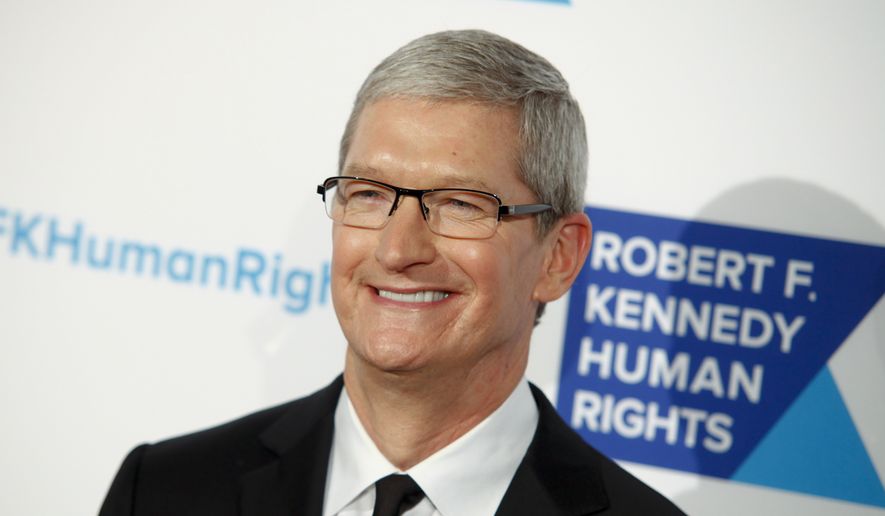Apple CEO Tim Cook defended his company’s decision to let iPhone users encrypt their data during an interview with 60 Minutes that aired Sunday, but not without being accused in return of catering to child pornographers and other undesirables.
With recent terror attacks having awakened a national security debate centering around robust, easily available encryption, Apple’s top exec said during Sunday night’s broadcast of 60 Minutes that smartphone users should have the ability to protect their digital data.
“I don’t believe that the trade-off here is privacy versus national security,” Mr. Cook told CBS News’ Charlie Rose. “I think that’s an overly simplistic view. We’re America. We should have both.”
“Here’s the situation,” Mr. Cook continued. “On your iPhone, there’s likely health information, there’s financial information. There are intimate conversations with your family, your co-workers. There’s probably business secrets and you should have the ability to protect it. And the only way we know how to do that, is to encrypt it.”
Concerns over Apple’s decision to let iPhone users rely on end-to-end encryption to communicate through the company’s proprietary iMessage service has mounted since the feature was enabled by default last year, gaining new steam in recent months among lawmakers and law enforcers alike amid fears that bad actors are evading authorities with the technology.
“If the government lays a proper warrant on us today then we will give the specific information that is requested,” Mr. Cook said during Sunday night’s broadcast. “Because we have to by law. In the case of encrypted communication, we don’t have it to give. And so if like your iMessages are encrypted, we don’t have access to those.”
Critics didn’t wait long to respond to Mr. Cook’s remarks, with Manhattan’s district attorney, Cyrus Vance, firing off a statement Sunday urging Congress to take action.
“iPhones are now the first consumer products in American history that are beyond the reach of lawful warrants. The result is crimes go unsolved and victims are left beyond the protection of law,” said Mr. Vance, who previously insisted that investigators have been unable to acquire evidence from upwards of dozens of phones collected from suspected criminals since last year.
“Because Apple is unwilling to help solve this problem, the time for a national, legislative solution is now,” he added.
Senator Tom Cotton, Arkansas Republican, didn’t delay in responding either, accusing Mr. Cook in a statement set out Monday morning of having “omitted critical facts about data encryption.”
“While it may be true that Apple doesn’t have access to encrypted data, that’s only because it designed its messaging service that way,” said Mr. Cotton. “As a society, we don’t allow phone companies to design their systems to avoid lawful, court-ordered searches. If we apply a different legal standard to companies like Apple, Google and Facebook, we can expect them to become the preferred messaging services of child pornographers, drug traffickers and terrorists alike—which neither these companies nor law enforcement want.”
Sen. Dianne Feinstein, California Democrat, said earlier this month that she was working with Senate Intelligence Chairman Richard Burr, North Carolina Republican, on a legislative proposal to handle the “growing dark” problem authorities blame on increasingly ubiquitous encryption.
“I think this world is really changing in terms of people wanting the protection and wanting law enforcement, if there is conspiracy going on over the Internet, that that encryption ought to be able to be pierced,” Ms. Feinstein said.
Speaking with 60 Minutes, Mr. Cook cautioned that creating a mechanism to bypass encryption would inevitable be abused.
“If there’s a way to get in, then somebody will find the way in,” he said. “There have been people that suggest that we should have a back door. But the reality is if you put a backdoor in, that backdoor’s for everybody, for good guys and bad guys.”
“There is a misconception that building a lawful intercept solution into a system requires a so-called ’backdoor,’ one that foreign adversaries and hackers may try to exploit,” FBI Director James Comey said last year. “But that isn’t true. We aren’t seeking a back-door approach. We want to use the front door, with clarity and transparency, and with clear guidance provided by law.”
• Andrew Blake can be reached at ablake@washingtontimes.com.




Please read our comment policy before commenting.